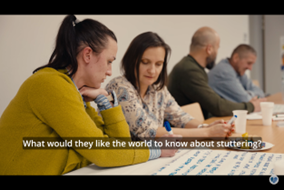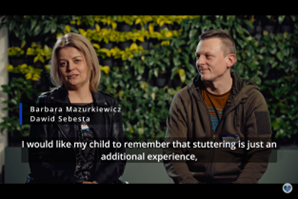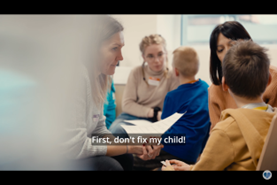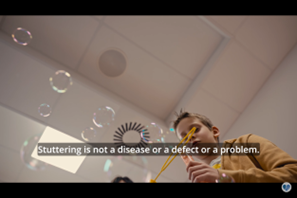 About the Authors: About the Authors:
Katarzyna Węsierska is an Assistant Professor at the University of Silesia in Katowice, Poland and an SLP at the Logopedic Centre in Katowice. She co-founded the Logopedic Centre Foundation. She is a European Fluency Specialist and a coach of the European Clinical Specialization in Fluency Disorders. In her research and clinical practice, she focuses mainly on stuttering and cluttering. She has been actively involved in many research projects in the framework of the International Project on Attitudes Toward Human Attributes – IPATHA. She is the main coordinator of LOGOLab workshops for school-age children who stutter and their parents, which have been organized at the University of Silesia since 2017. At these workshops, she works with the parent groups.
|
About five years ago, the LOGOLab workshops for children who stutter and their parents were organized at the University of Silesia in Katowice, Poland for the first time. The program consists of a series of monthly meetings organized separately: the children’s group and the parents’ group. Experienced fluency specialists, SLT students, and members of Polish self-help groups volunteer in this program. They are involved in all program activities. Attending the program is free for all of the participants. Children who stutter are recruited to the program through local speech-language therapists.

The main purpose of the meetings is to change attitudes towards stuttering in the children who stutter themselves and in their environment. During these meetings, conditions are created so that children can desensitize themselves to stuttering and become mentally resilient, fulfilled speakers who know their worth. The sessions provide a safe haven where children can experiment in a friendly atmosphere and confront various challenges while overcoming their fears and limitations. All this happens in a safe and accepting environment, which encourages children to act more in real world conditions.
Parents, on the other hand, have the opportunity during these workshops to meet with various specialists – speech-language therapists, psychologists – who are often people who stutter.

The participants have discussions and exchange views. These activities not only allow parents to reevaluate their attitudes towards stuttering but also expand their abilities to effectively support their children. Workshops that focus on parents and caregivers are designed to strengthen their sense of empowerment and readiness to take on the role of advocates for their children.

Successive editions of these workshops have so far resulted in several short movies (available at: www.logolab.edu.pl). This year, several videos were also made with the participation of SLT students, children and parents. The parents’ movie deserves special attention. During one of the parent meetings, a brainstorming session took place. Parents together with their therapists discussed what they would like the world at large but also their children specifically to know about stuttering . The video below presents a summary of this discussion.

In our opinion as therapists, what the parents said is priceless and worth disseminating! We love how they totally reversed from having a fix-my-child focus to a child’s well-being focus. What is extraordinary, is that this shift happened within a period of a few months. We believe this short documentary perfectly fits in with this year’s ISAD slogan ‘Being seen, being heard – Representation and normalization of stuttering in the mainstream!’. We are convinced that parents’ opinions, knowledge, and experiences should be disseminated that parents’ voices should be heard. Unfortunately, this is still not a common practice in our country. We hope that the activities we intend to organize in celebration of this year’s ISAD in Poland will enable us to spread this message. We firmly believe that materials such as this video can help us to ‘create a world that understands, accepts, and supports people who stutter.’
We thank the parent group for their courage and determination to support their children and create a world that is friendly to children who stutter. We thank them for agreeing to make this movie public.
Here is the link to the movie on YouTube.
![]()

 Monika Pakura, Ph.D.,
Monika Pakura, Ph.D., Izabela Michta
Izabela Michta
Cześć i dzien dobry! Hello from the United States!
Thank you for all of your hard work. Oh how far you’ve all come in these five years! Through your passion and dedication, so many people have benefitted from your important initiative. Here’s to many, MANY more magical years. <3
Hi Erik,
Thank you for your kind words. But most of all, thank you for supporting our initiatives in Poland. It is also thanks to you that it is easier for us to change the conditions of the environment here. So that the environment better understands the needs of children who stutter. Cooperation with you is a great pleasure – thank YOU!
Greetings from the U.S.! I want to thank you Katarzyna Węsierska, Monika Pakura, and Izabela Michta for sharing about LOGOLab workshops.
I’m trying to imagine the amount of effort that would go into starting an endeavor like these monthly workshops. The goal of introducing a new mindset to individuals who’ve been impacted by stuttering by creating friendly environments and encouraging opportunities to overcome fear seems easy to say but possibly difficult to implement. It’s inspiring to hear of the impact in such short period of time.
What moved me was when you described the change in parental framework from a “fix-my-child focus to a child’s well-being focus.” It seems to me that this transition alone would have monumental affect in the daily living experiences of both child and parent. You mentioned in the article parents meeting with specialist and later sharing their experiences in a video (which I am checking out). What would you say have been the most impactful elements within your workshops that help parents make this transition?
Thanks again!
Hi, Thank you for your positive feedback. It’s important to us, and we believe it will also be valuable to the parents who decided to appear in front of the camera. We are full of admiration for their courage and willingness to support their children.
It is challenging to answer what has the most significant impact on the change that takes place in parents. We of course also ask them how they perceive it and what is essential during these meetings. They mention that contacting other parents plays a crucial role for them. No less important are meetings with people who stutter themselves and, at the same time, help others who stutter (e.g., as speech-language therapists, psychologists, and/or leaders of the self-help movement for people who stutter). Their testimonials have a huge impact on parents. It is probably a combination of many factors. Gaining knowledge about stuttering and becoming open about it allows for greater acceptance and normalization, which benefits children and parents.
Dear Kasia, Monika and Izabela,
Thank you for sharing your work.
Congratulations on this important, life-changing work. Congratulations, too, on changing the narrative around stuttering.
Wishing you continued success and fulfillment.
Hanan
Hi, thank you for such warm words. We are very pleased to read them. We believe that the small steps can make a big change in the future 🙂
I love this concept. As a parent of a child/teen who stutters making sure when they go to therapy that they feel comfortable and are able to address real life situations is important. Having the parents involved and be able to truly understand what their child is going through is an important part of the therapy process. I do think that there is a lot of stigma placed on individuals who stutter and being able to educate more is important for the future.
Thank you for your comment from the parent’s perspective. We have received similar feedback from the LOGOLab parent group (by the way, we have just started another edition of these workshops). They shared their point of view with us. They commented that it is vital for them that their children can get support and meet a group of people with similar experiences, but also they, as the parents have such opportunities. We therapists should remember how important it is to make parents comfortable because, among other things, parents’ attitudes and behaviors affect what children think about stuttering and how they deal with stuttering. Once again, thank you so much for your feedback.
Hello! Our names are Ashlynn, India, and Lauren, and we are second-year graduate students in the Communication Sciences and Disorders department at the University of South Carolina. Thank you so much for sharing your work on this platform. As future clinicians, we are learning a lot on how to best support and work with individuals who stutter. We found it so helpful to hear directly from parents on what they want from an SLP.
We think support groups can be very beneficial, especially after seeing how much progress you saw in just a few months. The mindset change the parents saw from trying to fix their children to focusing on their wellbeing was particularly encouraging to see! Do you have any suggestions if we were to start a support group, what should we expect in planning the monthly meetings? Do you have any advice in how to start something like this?
We appreciate your input!
Hi Ashlynn and Lauren,
Thank you for your kind words. In our opinion, support for parents should start with recognizing their needs and expectations and finding out what they expect from us. We do this at the first meeting, right after we help parents integrate as a group.
We ensure to get their opinions regularly and ask them what else they would like to do during these meetings. They usually talk about how important it is to get to know other parents and their experiences. They also appreciate that we make it possible for them to meet with other specialists. Above all, they praise these group sessions when we organize meetings with adults who stutter. We also try to provide them opportunities to acquire knowledge and competence about communication, stuttering and being attentive parents. For example, we organize screenings of films (such as “When I stutter,” in which we have a Polish version). We talk about various books. We recommend them to parents and ask them to review these books. It is crucial for us that parents have plenty of opportunities to desensitize themselves so that stuttering no longer scares them and that they can treat it as something obvious. When they feel that they are ready to talk to others about stuttering (for example, to their children’s teachers), we know that we have succeeded. However, we also understand that this is a process and some people need a very long time, and we need to be patient and understanding. The group helps ideally with this.
Thank you for doing what’s so important! As yes, society still thinks we need to be fixed, instead of just being happy and wanting to talk, no matter how. So not only parents need to get this message, but also teachers, other family members, parents to friends, etc. That’s why I so wish also these were invited in the therapy room, or an SLP or PWS coming into the classroom, library etc. The stigma needs to be fixed, and we’re so happy you’re helping us with that.
Keep them talking
Anita
Dear Anita,
Thank you so much for your words; they are valuable to me. For me personally, every chance to meet you or listen to your speeches is a source of great inspiration. In my opinion, what you are doing in the field of educating the public about stuttering is crucial. I thank you and all the activists in your organization for your work. Thanks to people like you, this strange world is a little better place to live in. Please don’t give up on what you are doing and keep working. After all, that’s what really counts in life.
Warmly, Kasia